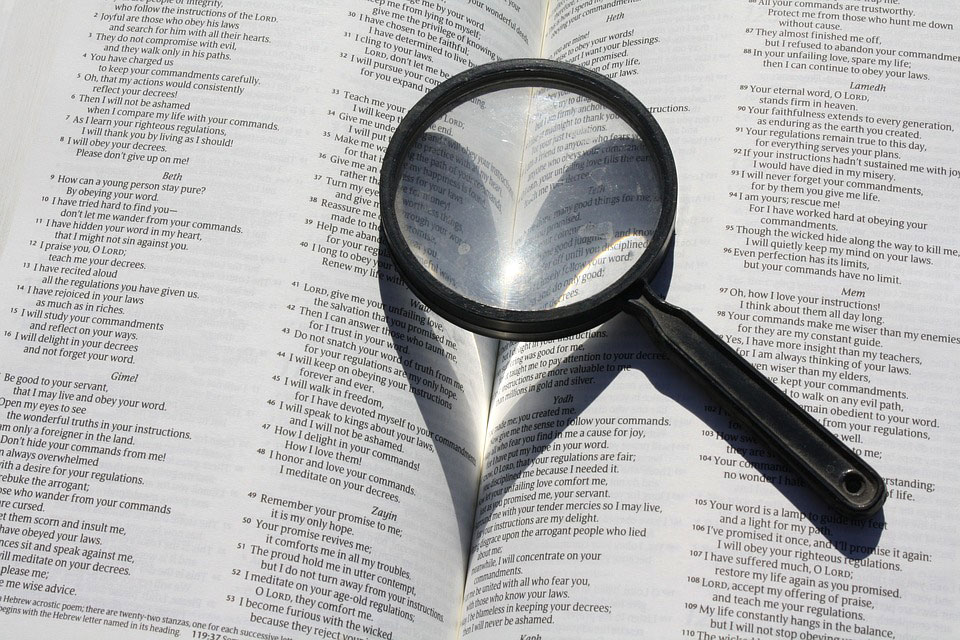
So, is the Bible reliable? Short answer: yes.
Long answer – well, 2,000 years and counting answer – yeeeeeeeeeeeeeeeeeeeeeeeeee …
Let’s take a step back and ask the obvious: “What is the Bible reliable for?” Seems only natural to have the answer to that question as a prolegomenon of sorts for the answer of today’s blog. I say ‘natural’ but I mean ‘obvious.’ If you were to ask, “Is the Bible reliable as a wedge to steady an uneven table leg?” obviously the answer is yes, much like any other book. “Is the Bible a reliable flak jacket?” … Well, watch enough westerns, and the outlaw who never got rid of the pocket Bible of his youth and miraculously sits up after a high noon shootout revealing a hole from about Genesis to “Blessed are the poor in spirit” would say yes. “Is the Bible reliable for teaching magic tricks?” Well, not really, no – unless you can figure out exegetically what Balaam put in the feed. Will a flight attendant ever demonstrate how to unhinge a lectern Bible from underneath your seat? Not likely; they aren’t reliable flotation devices … They would be, however – especially if it’s the new ESV study Bible – reliable deadly weapons – that is, of course, if you can wield a claymore sharp enough to divide joints and marrow yet blunt enough to make any “thumper” proud.
So, what definition of reliability are we trying to saddle the Bible with? I think the Apostle Paul puts it nicely in his second letter to Timothy: scripture is “able to make us wise for salvation through faith in Jesus Christ …” and “… that the man (read “person”) of God may be complete,” No matter what genre a text falls into, regardless of the intent of the author who contributed to this or that part of the Bible, it exists, en totum, to teach us about how we can be complete persons in the salvation of Jesus Christ. Period.
It isn’t a scientific textbook, even though certain texts were meant to be taken literally and quite scientifically. It isn’t a 21-century historiography, although some events in the Bible are recorded that way. It isn’t an almost 800,000-word allegory, nor is it a 66-part poem, despite its having many of them in its corpus. Simply put, the Bible is a collection of writings that teach us our purpose and destiny in Christ. Now, is it reliable?
Well, if it were to make us knowledgeable about such things, and we are now 2,000 years removed from its autographa (the original writings themselves), then we’d need to know how it got to us now – how it has been transmitted through the ages to get to us right here, right now. Because it may be the case that it could make a fourth-century Roman or second-century Egyptian wise for salvation, but isn’t it highly likely that it has been changed over the years? After all, the most unreliable and corrupt part of any religion are the people in it – people who can’t be trusted when it comes to honestly, faithfully, and fastidiously copying a text which can wield so much power over people. And we must understand that despite the printing press being invented in the 15th century, handwritten copies were still the norm for hundreds of years after that – printing was expensive, and almost as slow as handwriting. So, for 1,600-plus years the Bible went through handwritten copy after handwritten copy after handwritten … This feels like cheating that I can just type.
A Story of Three “Scriptures”
Let’s examine three different “scriptures,” and while you read, determine for yourself which one sounds like it would be the most reliable.
- God appears to a man and instructs him that he will lead his people into salvation by following His very words, the whereabouts of which an angel will come guide him to. Right on schedule the angel guides him to a book written in “God’s” language and gives this man the supernatural ability to translate it; he does, and the angel takes the book back. This translation then remains the book of the church for its complete and ongoing history; a book that for the most part hasn’t changed much, aside from a few alterations which God Himself authorized the leaders and prophets of the church to make. One man translates one book, throughout history … ish.
- An angel appears to a man and pronounces God is finally ready to reveal Himself through this man, and here it is. The man then proceeds to receive the direct words of God and memorize them verbatim. He then marshals others to join in on the task and memorize these divine revelations about the ultimate nature of reality. Now, that man dies but as the next leader of that people takes power he realizes that men can die and the words might then also; so these holy men who have hidden the words of God in their heart take to the pen and pad. It isn’t until the third leader of these people arises that all these now variegated and sundry writings on the oracles of God are collected and collated. That which is determined by this leader to be canon is kept; everything else is given to the flames. God reveals Himself to one man, and only three generations later it is collected and made into one official holy book, the same one that has existed throughout its history.
- God reveals Himself to a whole mess of people. A small number of them start writing those stories and what it all means down on whatever they can find – animal hide, parchment, scrolls, anything. People, being so anxious to spread these stories, start copying and copying and copying. But these people are sort of criminals, or rebels in their day, and being caught with a copy of these stories and commentaries could land them in a world of hurt, so they copy in the dark, in the secret, and as quickly as they can. These are also not educated or necessarily literate folks either, and the language of their time is written in
ALLCAPITALSANDVIRTUALLYNOPUNCTUATIONSOITISVERYDIFFICULTTOSEEIFYOUWERENTTRAINEDOFCOURSETOSEEWHEREONEWORDENDSANDONEWORDSTARTS. These copies are sent and replicated in three different continents and multiple different languages, and all the while still copied and copied and copied. This scripture is now an amalgam of all those copies and translations.
So, which one would you trust the most? The presupposition here, of course, is that God indeed revealed Himself … So if He did, which one seems more divine, more likely to preserve a text over the millennia that can make us wise for His salvation, which He revealed in the first place?
I like the first two, to be honest; I feel safe with the first two … Not a lot of room for error, no space for corruption or a lot of corruption, anyway. I like the first two … that is, of course, until I realize that with them I have to trust a guy like me with the very words of God to bring a guy like me all the way to glory. I know, both through history and a quick peruse around my heart, what I would and could do with a text people believed were the very words of God, words that could give cadence to the whole earth’s march. I like the first two stories until I realize that I would, as a Mormon (story #1), have to put as much faith in Joseph Smith as I do in God Himself, and, as a Muslim (story #2), as much faith in Uthman (the third leader, or Caliph) as I would in Muhammad and Allah. No Mormon or Muslim has an original or even a glimpse into what the original could be. Their faith in salvation, who God is, what He wants from and for us, His promises, His woes, and anything else pertaining to our relationship with God, is placed on the feeble shoulders of one man or one solitary moment, and hopefully they got it right.
Not so with Christianity. Instead of having to heave as much faith on one or two people to get the words of God right as we do on God Himself for the very salvation described in those words, we as Christians can trust a much larger body of testimony, as it were (and as it still is).
All those copies and translations described in story #3 are for the most part still around. We don’t have to trust the one text of Uthman or the one translation of a lost set of golden tablets by Joseph Smith. We can look at a body of texts numbering in the 20,000s to see what was being said about Jesus revealing Himself as our salvation and purpose and destiny. The only problem is … all those dang mistakes!
Mistakes?!?!

Let me give you the classical argument against what is called the tenacity of the New Testament text. Let me try my best at tearing down the reliability of the New Testament based on modern day argumentation.
There are roughly 138,000 words in the Greek New Testament. Now, every time someone copied one of those words or books of the New Testament and the resulting copy had a difference, slight or large, that was called a variant – but now, with my skeptic hat on, I’ll call it a mistake. And do you know how many mistakes there are? Over 400,000! Now, while that’s exactly what you should expect given the process through which the New Testament was transmitted, how could you possibly trust that you have the words you were intended to? Do the math – that’s almost three different options per word in the New Testament! Wise for salvation? More like wise for confusion!
Scary, right? Well, before we drive off the cliff into full Nietzschean nihilism because we obviously can’t ever know what God said, let’s pump the brake a couple times by asking about that many questions. Are those 400,000-some odd mistakes all meaningful, and are they viable?
If you received five letters from five different government agencies alerting you that you had won some nationwide lottery, but all five contained an error in capitalization on some word, would it be a meaningful change to the content of the message? Would you not go collect your winnings, despite the texts reading “You have won” or “you Have won” or still “you have Won”? And if upon arriving back home, cheque in hand, another letter was waiting for you reading, “collect your winings, you have won,” would you throw away the cheque because of the misspelled “winnings,” or would you simply shrug and say, “Because the mistake came way after it would have needed to in order to change the meaning of the originals, it isn’t viable to change the fact that I now am rich”?
I am not being hyperbolic when I say to you that 99% of all those variations, or mistakes, are in no way meaningful. They are word-order changes, spelling errors, capitalization problems, and mistakes like the difference between “then Jesus went up on a hill to pray” and “then Jesus went up on an hill to pray.” These men and women who risked life and limb to copy the gospel and its kid brothers, the epistles, wanted to spread the message, not garner power; there was none to be garnered, unless of course you view being tarred and burned alive as a human torch powerful. So, while their motives preserved the message, their fear, monetary constraints, and inexperience as scribes added to the text these variants represented by spelling and grammar. So, if my math is right, we have 1% or 4,000 variants left to deal with – variants that are meaningful … but are they viable?
As it turns out, about half of these are early enough in the textual transmission to be viable. If for 1,300 years a certain passage reads something like “For God so loved the world,” then a variant starts to appear in a certain stream of texts after that point which reads “For God so hated the world” … well, that would CERTAINLY be meaningful. That is no mere spelling problem; that has serious theological implications – but why trust the change? The older and closer to the proposed original a copy gets, the more clout it has in testifying of the original itself. A change at some point 1,300 hundred or even 500 years after the fact isn’t going to be taken as seriously as a change 200 or 100 years after the original.
So, we’re left with .5% percent of 400,000 variants in the New Testament – or, for 138,000 words, about 2,000 words to examine – that are meaningful and viable to the original text itself. Or, to put it another way, with over 1.3 million pages of handwritten text over 1,600 years (prior to printing presses in wide circulation), there are about 2,000 words we have to deal with that seem to affect the message of the New Testament. If we take a second to consider that, perhaps we can now award a posthumous miracle to Jesus: “… heaven and earth will pass away, but My words will never pass away.”
A lot of skeptics criticize Christianity as a bad worldview because it is unfalsifiable, therefore indefensible. But I disagree with their description of the penetrability of our ideology. I think Christianity is falsifiable – the subject at hand is one such way you could falsify it! If Jesus was God, and He claimed nothing could stop His words, but we as mere mortals did, then how is it that Jesus was God – and if not, then whence came Christianity? Disproving Christianity would be difficult, but not impossible … Just get rid of any trace of the Bible, kill all those who had a piece of it memorized, and voila – Christianity disproven.
At this point a skeptic would say, “But you still have those 2,000 variants to deal with – you have lost His words!” But that is simply incorrect. A more appropriate representation of the problem Christians face when examining all these variants is, “Which word is the right word?” and not “I wonder what Jesus or Paul or Peter said here.” The New Testament has been accurately described as a 1,000-piece jigsaw puzzle with 1,100 pieces.
And just what are these meaningful and viable variants anyway? What is an example of one such hole in the puzzle for which there are multiple possibilities? Well, how about Revelation 15:3: “… just and true are your ways, King of nations/ages/saints.” There are three options for that last word; there are three different variations at that spot in manuscripts that are early enough to be viable. And I would say they’re meaningful as well … A nation is different than a saint is different from an age … So what is it?
First of all, and most obviously, all three are true of Jesus (the subject of the passage) when you examine the whole of the New Testament, so it doesn’t seem to be provocative despite its being meaningful or viable. Secondly and more importantly, however, we can study John, the author of said passage; we can study His theological leanings, his writing style, his vocabulary, and come to a fairly wide consensus on what he originally intended of the three. This process is called textual criticism, and is a historical science that is reputable as a great way to discern what the ancients have written down regardless of how the not-so-ancients have copied what they wrote.
 Is the Bible reliable to make us wise for salvation and wholeness through and in what a historical person, Jesus of Nazareth, has done and said? The answer is yes only if we have today what was recorded then … And in God’s great goodness and wisdom, He has left us with a treasure trove of documents that have the familiarity of a human’s hand in its mistakes, and the believability of its miraculous nature in its unified picture of what salvation and wholeness as a person is – Jesus.
Is the Bible reliable to make us wise for salvation and wholeness through and in what a historical person, Jesus of Nazareth, has done and said? The answer is yes only if we have today what was recorded then … And in God’s great goodness and wisdom, He has left us with a treasure trove of documents that have the familiarity of a human’s hand in its mistakes, and the believability of its miraculous nature in its unified picture of what salvation and wholeness as a person is – Jesus.
Written by Sterling Hunter



